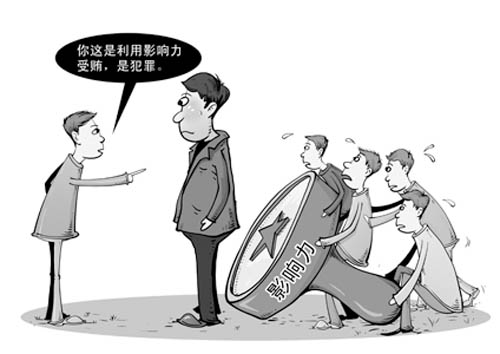Online exposure to battle corruption
| ?
|
|
The charge of "using personal influence to take bribes" was officially added to the "Criminal Law of the People's Republic of China" on October 16. [China Youth Daily/Fu Xingye] |
The charge of "using personal influence to take bribes" was officially added to the "Criminal Law of the People's Republic of China" on October 16 by the Supreme People's Court and Supreme People's Procuratorate. Additionally, the fourth plenary session of the Central Commission for Discipline Inspection of the CPC Central Committee released a provision last month that requires leading officials to register their personal apartments and investments, as well as their spouses and children's employment status. Requiring leaders to register this information indicates that China has started a crusade against corruption.
According to Wang Wei, a political science professor at the China National School of Administration, the charge of "using personal influence to take bribes" was actually previously adopted by courts in some corruption cases. Now, the Supreme People's Court and Supreme People's Procuratorate give the charge a concrete definition and make it more convincing for a sentence in court. "The program of building anti-corruption system is moving ahead," said Wang.
Cai Dingjian, director of the Constitutional and Policy Research Center at the China University of Political Science and Law, also gives support to the new provisions. But he believes punishment alone is not enough to solve the issue, as the goal should be to find and eliminate where the bribery crimes start. "Why some officials still take the risk is because only a small fraction of corrupt officials get punished by law, which makes others think that they too, will get away with corruption," said Cai.
As corruption has become a serious problem in society, people are called on to take part in helping to monitor officials' work. An online poll by China Youth Daily shows that out of 1,983 participants, 71.5 percent are willing to fight against corruption. One multiple-choice question, "Which is the best way to crusade against corruption?" had the following results: online exposure (75.5%); inform against corrupt officials (58.2%); media exposure (53.8%); information disclosure (48%); petition (30.6%); audit (30.1%).
Wang Peirong, a teacher at the College of Science at China University of Mining and Technology in Jiangsu Province, has experience in revealing information against corrupt officials. On July 6, 2008, he spent all night sending thousands of e-mails and posting articles on Bulletin Board System to disclose that the former Quanshan district secretary of Xuzhou City, Dong Feng, had committed serious crimes of bribery and corruption. Dong was arrested one month later, after an investigation. Wang has since been honored as a "great anti-corruption informant on the Internet."
"However," said Wang, "informers usually face dangerous revenge. I hope the government can set up a relevant department to protect informers."
Ren Jianming, the director of Clean-fingered Politics and Governance Research Center at the School of Public Policy and Management, Tsinghua University, points out that China's Constitution actually already includes a rule to give informers protection, but the responsibility hasn't been assigned to any particular executing agency. He indicates that the Independent Commission Against Corruption of Hong Kong (ICAC) has set a good example for the mainland to crusade against corruption. Hong Kong ICAC is not only in charge of collecting information against corrupt officials, but also providing protection for informers.
Before the 1970s, Hong Kong had similar corruption issues to those the mainland is experiencing today. When punishment to prevent corrupt officials was not successful, Hong Kong decided to combat corruption at its roots. Hong Kong successfully set up the ICAC in 1973 and earned back the trust of its citizens. Now that informers can get protection from the law, Hong Kong has gradually become one of the world's cleanest places of politics.
Ren believes the only effective way of combating corruption is to build an efficient system that attacks its roots.
According to the poll, the seven most hated kinds of corruption are: bribery, malpractice, misuse of public funds, not punishing officials for major accidents, having a bad personal lifestyle, using public sector vehicles for personal reasons, and corrupt officials running away for shelter in another country.
"One of the most important elements for the Chinese mainland government to be successful in its anti-corruption efforts is to encourage people take part in anti-corruption work nationwide," said Ren.
Fortunately, more than half of the netizens that took part in the poll say they have great confidence in the mainland's anti-corruption program and will support it.
A recent online poll shows that out of 1,983 participants, 75.5 percent of them believe that online exposure is the best way to fight against corruption.
 0
0 







